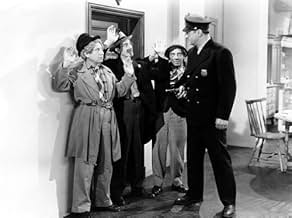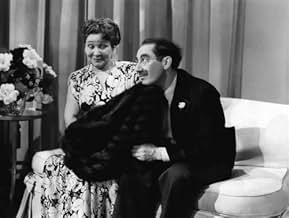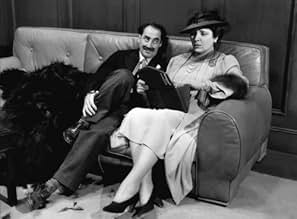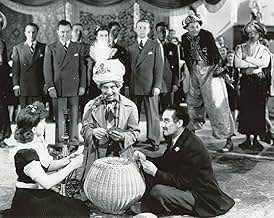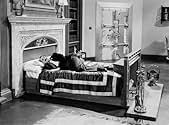AVALIAÇÃO DA IMDb
6,5/10
5,6 mil
SUA AVALIAÇÃO
Adicionar um enredo no seu idiomaA detective is hired to protect the life of a singer who has recently inherited a department store, from the store's crooked manager.A detective is hired to protect the life of a singer who has recently inherited a department store, from the store's crooked manager.A detective is hired to protect the life of a singer who has recently inherited a department store, from the store's crooked manager.
- Direção
- Roteiristas
- Artistas
King Baggot
- Store Employee
- (não creditado)
Marvin Bailey
- Member - Six Hits and a Miss
- (não creditado)
Avaliações em destaque
When people are asked which is their least favorite Marx Brothers movie, "The Big Store" is one of the most frequent choices. And it's not hard to understand why: this must be the Marx movie with the least comedy content in it - if not in quality, then certainly in quantity. Apart from the hilarious scene near the start where Margaret Dumont tries to explain the case "in detail" to supposedly busy detective Groucho while Harpo is typing loudly and a toaster goes out of control (a sequence that can make you laugh no matter how many times you see it), it's hard to name another classic piece of comedy here. The scene with the 14-member Italian family and the climactic chase inside the store are more chaotic and frenetic than funny (and there's also way too much fast motion used). On the bright side, this film has a better supporting cast than "Go West", "Sing While You Sell" is a grand and catchy number, Harpo and Chico have a delightful piano duet and Harpo's harp-playing scene is pure magic. While in many Marx Brothers movies I find the piano and harp numbers a dull interruption of the comedy, in "The Big Store" they are a welcome relief from the absence of comedy! **1/2 out of 4.
Same old note: The Marx Brothers INGENIOUSLY twist any phrase or object into HILARITY.
Unfortunately, this film has a plot.
The usual hilarity when The Marx Brothers are left to their own devices, but too much screen time not dedicated to The Marx Brothers.
NOTE: If you have a heart-beat and love to laugh yourself silly, you MUST see Horse Feathers, Duck Soup, The Coconuts and Monkey Business.
Unfortunately, this film has a plot.
The usual hilarity when The Marx Brothers are left to their own devices, but too much screen time not dedicated to The Marx Brothers.
NOTE: If you have a heart-beat and love to laugh yourself silly, you MUST see Horse Feathers, Duck Soup, The Coconuts and Monkey Business.
While I disagree with the conventional wisdom about the Marx Brothers' film made before The Big Store, Go West (1940), believing it to be yet another one of their many masterpieces, I have to agree with the conventional wisdom about The Big Store. It has the feeling of a contractual obligation film. One, two or all three of the Marx Brothers are absent for long periods of time. The story is often confusing. The film doesn't flow very well. Some of the material featuring other performers simply doesn't work. Even when it does work, it's never as good as the Marx Brothers' material, and even their work is too often strangely flat.
The Big Store is really the story of Tommy Rogers (played by famed pop singer Tony Martin). Rogers has just gained partial ownership of the Phelps Department store with the passing of a relative. However, he's not interested in the store, so he plans to sell and use the money to build a state of the art music conservatory in conjunction with his friend, Ravelli (Chico Marx). Unfortunately, not everything at the Phelps store has been on the up and up, and surviving store manager Mr. Grover (Douglass Dumbrille) is worried about buyers discovering their creative bookkeeping. So they try to off Tommy, which leads to hiring private detective Wolf J. Flywheel (Groucho Marx) and his assistant, Wacky (Harpo Marx), who happens to be Ravelli's brother. At the same time, Mr. Grover is courting Martha Phelps (Margaret Dumont), Tommy's aunt, with machinations of eventual ownership of the store.
In terms of meatiness, that's far more of a plot than I usually relay, but all of that is presented in the first 10 - 15 minutes of the film. The remainder involves playing out those threads. The problem is that the above is way too complicated, especially for a Marx Brothers film. The Marx Brothers style was that plots were really secondary to their anarchic, madcap skits. In truth, the two were usually well integrated in their films, with meatier plots than the conventional wisdom has it, and the skits relatively seamlessly enmeshed in the plots.
Here, the plot is often difficult to follow, and when you do manage to follow it, it just isn't that interesting. Despite this, there are still a number of fabulous set pieces. The scene where we first meet Groucho and Harpo in Groucho's private eye office is hilarious. The bedding department scene is good. The climax, featuring an extended chase through the department store, is a lot of fun, including its cartoonish use of wire stunts and camera tricks.
But there just isn't enough of that stuff, and one of the Marx Brothers' strongest points--Groucho's verbal bantering, is oddly flat just as often as it isn't. Even the usual musical sequences are problematic, unlike their sublime charm in Go West. Only Harpo's musical sequence and a brief duet with Chico on the piano are worthwhile. Groucho is given a schmaltzy "big musical production number" that goes on too long, is supposed to be funny and isn't, and ends up with Groucho doing little else but mugging and doing his trademark walk while other characters we're not familiar with sing the song.
Tony Martin has a song early on in the film that's okay, but doesn't exactly fit the tone of the film, and later, he does another "big musical production number", called "The Tenement Symphony", that is bizarre, to say the least, but not particularly funny. Instead, it's a strange mish-mash of styles that is strongly derivative (in a negative way) of George Gershwin.
While Marx Brothers completest certainly can't avoid The Big Store, it's difficult to imagine this being anywhere near the top of the list for any Marx Brothers fan. It's also not a great way to introduce anyone to their work (as they're likely to not be very interested in seeing more), and there are far better films for casual viewers who are not particularly interested in the Marx Brothers.
The few hilarious scenes could easily be excised and work just as well (if not better) in isolation, as "random" skits. But the film is very slightly recommendable for them.
The Big Store is really the story of Tommy Rogers (played by famed pop singer Tony Martin). Rogers has just gained partial ownership of the Phelps Department store with the passing of a relative. However, he's not interested in the store, so he plans to sell and use the money to build a state of the art music conservatory in conjunction with his friend, Ravelli (Chico Marx). Unfortunately, not everything at the Phelps store has been on the up and up, and surviving store manager Mr. Grover (Douglass Dumbrille) is worried about buyers discovering their creative bookkeeping. So they try to off Tommy, which leads to hiring private detective Wolf J. Flywheel (Groucho Marx) and his assistant, Wacky (Harpo Marx), who happens to be Ravelli's brother. At the same time, Mr. Grover is courting Martha Phelps (Margaret Dumont), Tommy's aunt, with machinations of eventual ownership of the store.
In terms of meatiness, that's far more of a plot than I usually relay, but all of that is presented in the first 10 - 15 minutes of the film. The remainder involves playing out those threads. The problem is that the above is way too complicated, especially for a Marx Brothers film. The Marx Brothers style was that plots were really secondary to their anarchic, madcap skits. In truth, the two were usually well integrated in their films, with meatier plots than the conventional wisdom has it, and the skits relatively seamlessly enmeshed in the plots.
Here, the plot is often difficult to follow, and when you do manage to follow it, it just isn't that interesting. Despite this, there are still a number of fabulous set pieces. The scene where we first meet Groucho and Harpo in Groucho's private eye office is hilarious. The bedding department scene is good. The climax, featuring an extended chase through the department store, is a lot of fun, including its cartoonish use of wire stunts and camera tricks.
But there just isn't enough of that stuff, and one of the Marx Brothers' strongest points--Groucho's verbal bantering, is oddly flat just as often as it isn't. Even the usual musical sequences are problematic, unlike their sublime charm in Go West. Only Harpo's musical sequence and a brief duet with Chico on the piano are worthwhile. Groucho is given a schmaltzy "big musical production number" that goes on too long, is supposed to be funny and isn't, and ends up with Groucho doing little else but mugging and doing his trademark walk while other characters we're not familiar with sing the song.
Tony Martin has a song early on in the film that's okay, but doesn't exactly fit the tone of the film, and later, he does another "big musical production number", called "The Tenement Symphony", that is bizarre, to say the least, but not particularly funny. Instead, it's a strange mish-mash of styles that is strongly derivative (in a negative way) of George Gershwin.
While Marx Brothers completest certainly can't avoid The Big Store, it's difficult to imagine this being anywhere near the top of the list for any Marx Brothers fan. It's also not a great way to introduce anyone to their work (as they're likely to not be very interested in seeing more), and there are far better films for casual viewers who are not particularly interested in the Marx Brothers.
The few hilarious scenes could easily be excised and work just as well (if not better) in isolation, as "random" skits. But the film is very slightly recommendable for them.
The Big Store is not one of the Marx Brothers' best films, but it's worth watching once. Groucho still delivers a few good one-liners and insults to Margaret Dumont. Harpo and Chico have some good scenes (watch as an Italian immigrant accuses Chico of mocking his accent!). I actually think that the musical numbers in this one are wonderful, except for those by Tony Rogers, one of the many love interest duds who grace the Brothers' flicks. Maltin's right: The Tenement Symphony is a suicide-inducing number, and easily a low point in all of the Marx Brothers' films, except for the entire running time of Love Happy. But there's a great song and dance number when Groucho first enters the store. You have to catch the woman singing a jazzed-up version of Rock-a-bye Baby; I have never seen a more eerily emotionless visage on a human being. It's creepy and oddly beautiful. Chico and Harpo perform an awesome piano duet. There's also a scene where four young kids play the piano like Chico, which is very charming. And Harpo's harp sequence is pretty good (he plays Mozart on the harp, and then his two reflections accompany him with other, various string instruments). The final chase sequence is rather annoying. The Marx Brothers' fall came about when their films started overutilizing special effects, fast motion, and sound effects to enhance the comedy. Still, The Big Store is not a disaster, by any means. 7/10.
Groucho Marx, in one of the interviews in Richard Anobile's book about the brothers, admitted that the films after the death of Irving Thalberg (he meant after A Day At The Races) were not his favorite, and he considered them the team's worst films. This is not a totally fair evaluation. Two of the films (Room Service and A Night in Casablanca) were as good as Horsefeathers or Animal Crackers. But it must be admitted that At The Circus, Go West, The Big Store, and Love Happy (not to say their unfortunate solo performances in The Story of Mankind)were below par Marx. All had good moments in them - but only moments. If one can cut these films to only highlight their highlights the resulting anthology film would be almost as good as Room Service and A Night in Casablanca.
Groucho is Wolf J. Flywheel in this film - one of his catchiest pseudonyms. Like his later, tamer film role as Sam Grunion in Love Happy, he is a detective. Like Grunion he is living a hand to mouth existance, owing rent. In the last moments of the film Charles Lane forcibly reposes his car, an ancient vehicle (for 1941 America) with the sign, "Welcome Admiral Dewey, Hero of Manilla" on the back - the battle of Manilla Bay was in 1898, and the car looks like it just arrived on the scene before Dewey died in 1917. Groucho is therefore definitely interested in impressing and romancing his normal foil, Margaret Dumont, for financial security. In the end they and Harpo are in the car as it is towed away.
It was not the first time that Groucho played a character named Flywheel. In the missing year of 1934, while he and his brothers left Paramount after Duck Soup failed (and when Zeppo decided to become an agent rather than a straight man - a wise decision as he was a very successful agent), Groucho and Chico made a series of radio programs about a firm of shyster lawyers, Flywheel, Shyster, and Flywheel. The tapes of these broadcasts no longer exist (apparently) but the scripts have been published. Many of their routines appear to have been used in these scripts, which are funny. One hopes the tapes will still manage to turn up one day.
The best moments in the film are those dealing with Groucho trying to impress Dumont, and his confrontations with Douglass Dumbrille, as the conniving, pompous store manager Grover. Harpo's fantasy moment with two other Harpos playing a trio is fine. Chico really does not do too well in the film - nothing in particular standing out. This is not enough to sustain the film, until the final ten minutes.
The brothers have photographed Grover paying two goons to assassinate Tony Martin (the heir to Dumont, the owner of the store - Dumbrille wants to marry her to get control of the store). Dumbrille tries to get the photo back, and chases the brothers through the deserted departments of the store.
Douglas Dumbrille was a recognizeable movie villain throughout the 1930s and 1940s. He appeared opposite Crosby and Hope in Road to Utopia, and opposite Abbott and Costello in Lost in a Harem. In such roles he usually just gave the normally competent straight dramatic villainy that he gave in such films as Treasure Island (he was Israel Hands, who tries to kill Jackie Cooper/Jim Hawkins). But it was different with the Brothers, as he appeared in two films with them. He had played Morgan, the racetrack owner in A Day at the Races. Dumbrille was not the only actor who played in several Marx Brother films - Walter Woolf King was Gasparri in A Night at the Opera and was one of the two villains in Go West. Sig Ruman was Herman Gottlieb in A Night at the Opera, Dr. Leopold X. Steimetz in A Day at the Races, and Hans Stubel (the Nazi War Criminal in hiding) in A Night in Casablanca. Margaret Dumont appeared in seven Marx films, and Thelma Todd in Horsefeathers and Monkey Business. Ruman, Dumont, and Todd were all expert comic actors, and perfect foils for the brothers. King was okay, but no more. But Dumbrille was the interesting repeater in the bunch.
In A Day at the Races, Dumbrille had little to do, except to threaten Harpo for not throwing a race, and looking apoplectic while the brothers demolish his racetrack to prevent a race from occuring before their missing horse can be found. As such, his performance there is little different from his performance in Road to Utopia or Lost in a Harem. But the conclusion of The Big Store is different. Here, he steals the chase from the stars of the film
It is true that by 1941 the brothers were too old for the stunts needed - and so they use doubles (compare it to Go West a year before, where they still do some of their own stunt work). In some of the tumbles Grover is supposed to take, one can see that Dumbrille has a double too. But the difference is that the director noted that Dumbrille's unsmiling, stiff face can be used to punctuate what a ridiculous figure he could become. For he does become ridiculous, despite the grave reason for his chasing the brothers. Suddenly he has to do such ridiculous things as ride a bicycle in the store (a kid's bike at that) while wearing his floorwalker outfit) to catch the brothers who are on skates. He puts on skates too at one point, and falls into a counter full of ladies hats. He disappears behind the counter, and raises his head to show he is wearing a lady's hat with a flower on top. It's a priceless image, for his expression has not changed.
It is Dumbrille who makes the forced chase worth watching - it was (perhaps) his finest moment as a comic actor. I wonder if the brothers (especially the critical Groucho) ever stopped to realize how they had briefly abdicated their movie to a supporting player.
Groucho is Wolf J. Flywheel in this film - one of his catchiest pseudonyms. Like his later, tamer film role as Sam Grunion in Love Happy, he is a detective. Like Grunion he is living a hand to mouth existance, owing rent. In the last moments of the film Charles Lane forcibly reposes his car, an ancient vehicle (for 1941 America) with the sign, "Welcome Admiral Dewey, Hero of Manilla" on the back - the battle of Manilla Bay was in 1898, and the car looks like it just arrived on the scene before Dewey died in 1917. Groucho is therefore definitely interested in impressing and romancing his normal foil, Margaret Dumont, for financial security. In the end they and Harpo are in the car as it is towed away.
It was not the first time that Groucho played a character named Flywheel. In the missing year of 1934, while he and his brothers left Paramount after Duck Soup failed (and when Zeppo decided to become an agent rather than a straight man - a wise decision as he was a very successful agent), Groucho and Chico made a series of radio programs about a firm of shyster lawyers, Flywheel, Shyster, and Flywheel. The tapes of these broadcasts no longer exist (apparently) but the scripts have been published. Many of their routines appear to have been used in these scripts, which are funny. One hopes the tapes will still manage to turn up one day.
The best moments in the film are those dealing with Groucho trying to impress Dumont, and his confrontations with Douglass Dumbrille, as the conniving, pompous store manager Grover. Harpo's fantasy moment with two other Harpos playing a trio is fine. Chico really does not do too well in the film - nothing in particular standing out. This is not enough to sustain the film, until the final ten minutes.
The brothers have photographed Grover paying two goons to assassinate Tony Martin (the heir to Dumont, the owner of the store - Dumbrille wants to marry her to get control of the store). Dumbrille tries to get the photo back, and chases the brothers through the deserted departments of the store.
Douglas Dumbrille was a recognizeable movie villain throughout the 1930s and 1940s. He appeared opposite Crosby and Hope in Road to Utopia, and opposite Abbott and Costello in Lost in a Harem. In such roles he usually just gave the normally competent straight dramatic villainy that he gave in such films as Treasure Island (he was Israel Hands, who tries to kill Jackie Cooper/Jim Hawkins). But it was different with the Brothers, as he appeared in two films with them. He had played Morgan, the racetrack owner in A Day at the Races. Dumbrille was not the only actor who played in several Marx Brother films - Walter Woolf King was Gasparri in A Night at the Opera and was one of the two villains in Go West. Sig Ruman was Herman Gottlieb in A Night at the Opera, Dr. Leopold X. Steimetz in A Day at the Races, and Hans Stubel (the Nazi War Criminal in hiding) in A Night in Casablanca. Margaret Dumont appeared in seven Marx films, and Thelma Todd in Horsefeathers and Monkey Business. Ruman, Dumont, and Todd were all expert comic actors, and perfect foils for the brothers. King was okay, but no more. But Dumbrille was the interesting repeater in the bunch.
In A Day at the Races, Dumbrille had little to do, except to threaten Harpo for not throwing a race, and looking apoplectic while the brothers demolish his racetrack to prevent a race from occuring before their missing horse can be found. As such, his performance there is little different from his performance in Road to Utopia or Lost in a Harem. But the conclusion of The Big Store is different. Here, he steals the chase from the stars of the film
It is true that by 1941 the brothers were too old for the stunts needed - and so they use doubles (compare it to Go West a year before, where they still do some of their own stunt work). In some of the tumbles Grover is supposed to take, one can see that Dumbrille has a double too. But the difference is that the director noted that Dumbrille's unsmiling, stiff face can be used to punctuate what a ridiculous figure he could become. For he does become ridiculous, despite the grave reason for his chasing the brothers. Suddenly he has to do such ridiculous things as ride a bicycle in the store (a kid's bike at that) while wearing his floorwalker outfit) to catch the brothers who are on skates. He puts on skates too at one point, and falls into a counter full of ladies hats. He disappears behind the counter, and raises his head to show he is wearing a lady's hat with a flower on top. It's a priceless image, for his expression has not changed.
It is Dumbrille who makes the forced chase worth watching - it was (perhaps) his finest moment as a comic actor. I wonder if the brothers (especially the critical Groucho) ever stopped to realize how they had briefly abdicated their movie to a supporting player.
Você sabia?
- CuriosidadesSeventh and final film teaming of The Marx Brothers with Margaret Dumont.
- Erros de gravaçãoObvious doubles for the main characters during the finale chase sequence (except for close-ups).
- Citações
Mr. Grover: What experience have you had at a department store?
Wolf J. Flywheel: I was a shoplifter for three years.
- ConexõesFeatured in Classic Comedy Teams (1986)
- Trilhas sonorasTenement Symphony
(1941)
Music by Hal Borne
Lyrics by Sid Kuller and Ray Golden
Sung by Tony Martin (uncredited) and St. Luke's Episcopal Church Choristers (uncredited),
with Chico Marx (uncredited) and Harpo Marx (uncredited)
Principais escolhas
Faça login para avaliar e ver a lista de recomendações personalizadas
- How long is The Big Store?Fornecido pela Alexa
Detalhes
- Data de lançamento
- País de origem
- Idiomas
- Também conhecido como
- A Grande Loja
- Locações de filme
- Empresa de produção
- Consulte mais créditos da empresa na IMDbPro
- Tempo de duração1 hora 23 minutos
- Cor
- Proporção
- 1.37 : 1
Contribua para esta página
Sugerir uma alteração ou adicionar conteúdo ausente

Principal brecha
By what name was Casa Maluca (1941) officially released in India in English?
Responda

